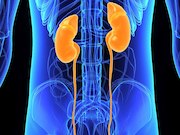Findings among adults undergoing kidney transplantation in Finland 1990 to 2010
THURSDAY, April 5, 2018 (HealthDay News) — There has been a large drop in infection-related deaths following kidney transplantation since the 1990s, according to a study published online April 5 in the Clinical Journal of the American Society of Nephrology.
Susanna Kinnunen, M.D., from the University of Eastern Finland in Kuopio, and colleagues assessed infectious causes of death and mortality rates for infections for two time periods (1990 to 1999 and 2000 to 2012) among 3,249 adult recipients of a first kidney transplant during the study period.
The researchers found that 29 percent of patients died during the follow-up period, with 204 of the 953 deaths infection-related. In the more recent cohort, the mortality rate (per 1,000 patient-years) due to infections was lower versus the previous cohort (incidence rate ratio of infectious mortality, 0.51). Among the infectious deaths, the main causes were common bacterial infections: septicemia (38 percent) and pulmonary infections (45 percent). Viral or fungal infections caused only 2 and 3 percent of infectious deaths, respectively. Opportunistic bacterial infections also only rarely caused death. The first post-transplant year saw only 11 percent of infection-related deaths. In multivariable analysis, factors associated with increased risk of infectious death included older recipient age, higher plasma creatinine concentration in the first post-transplant year, diabetes as a cause of end-stage renal disease, longer pre-transplant dialysis duration, acute rejection, low albumin level, and earlier era of transplantation.
“The risk of death due to infectious causes after kidney transplantation in Finland dropped by half since the 1990s,” the authors write.
Full Text (subscription or payment may be required)
Copyright © 2018 HealthDay. All rights reserved.








